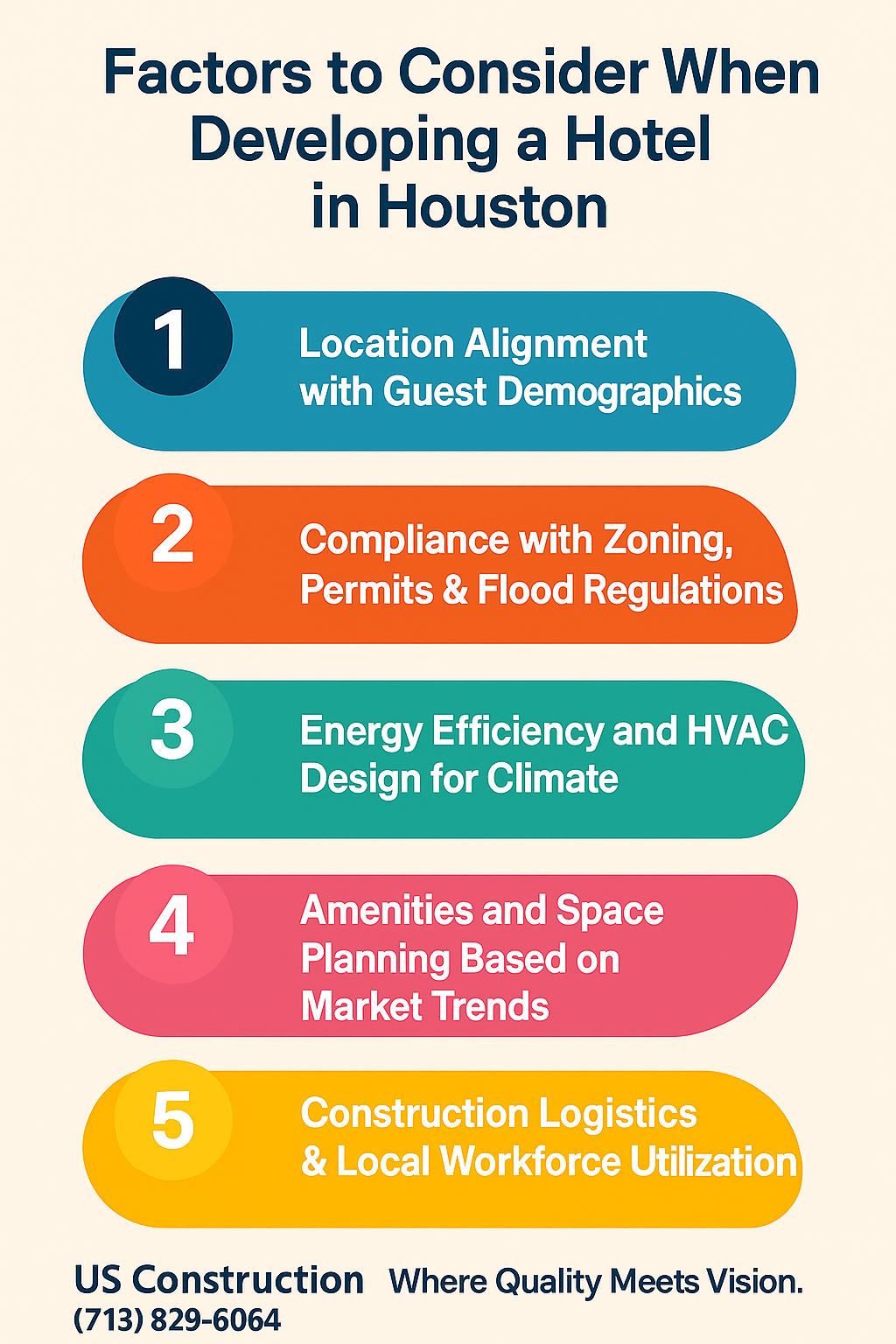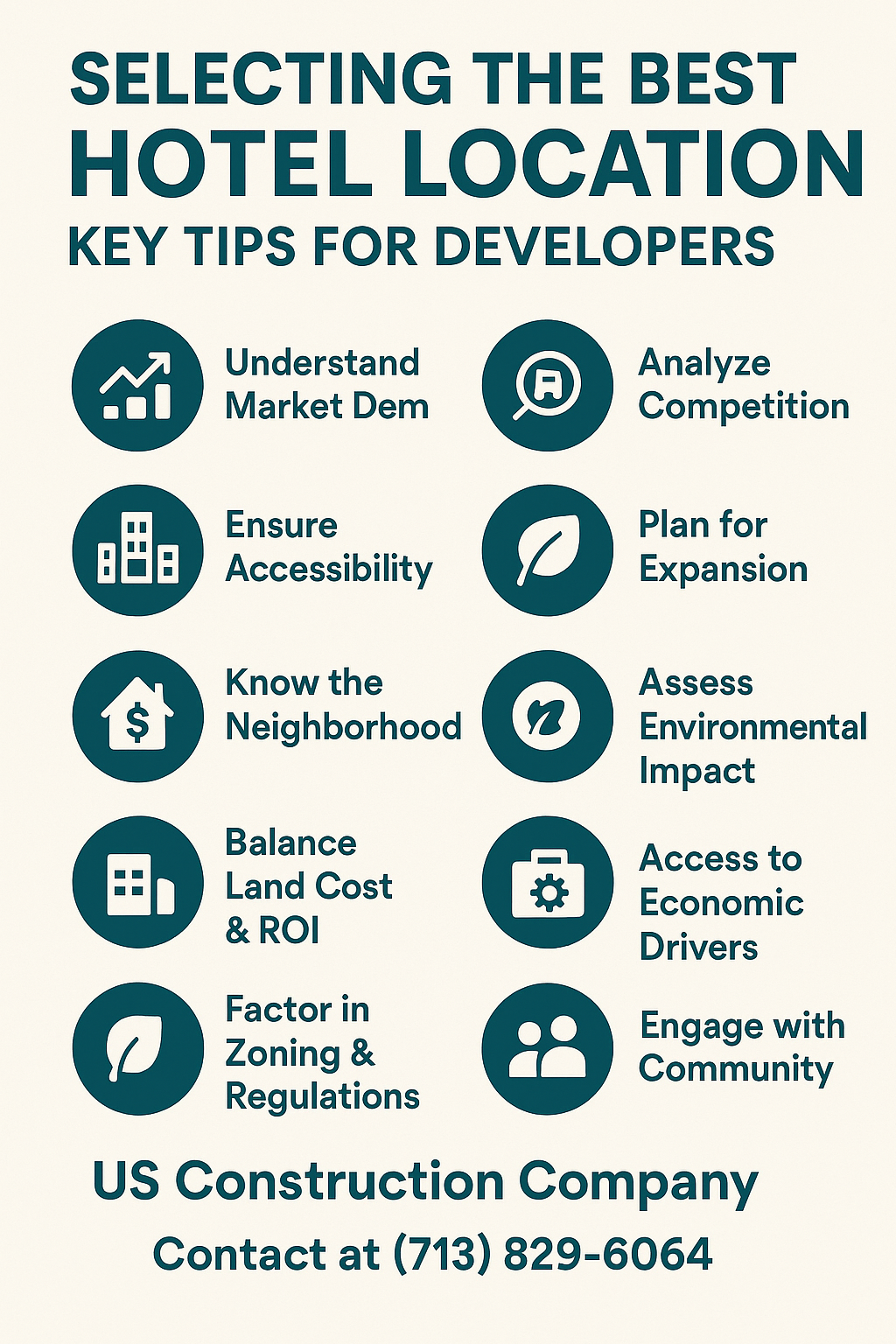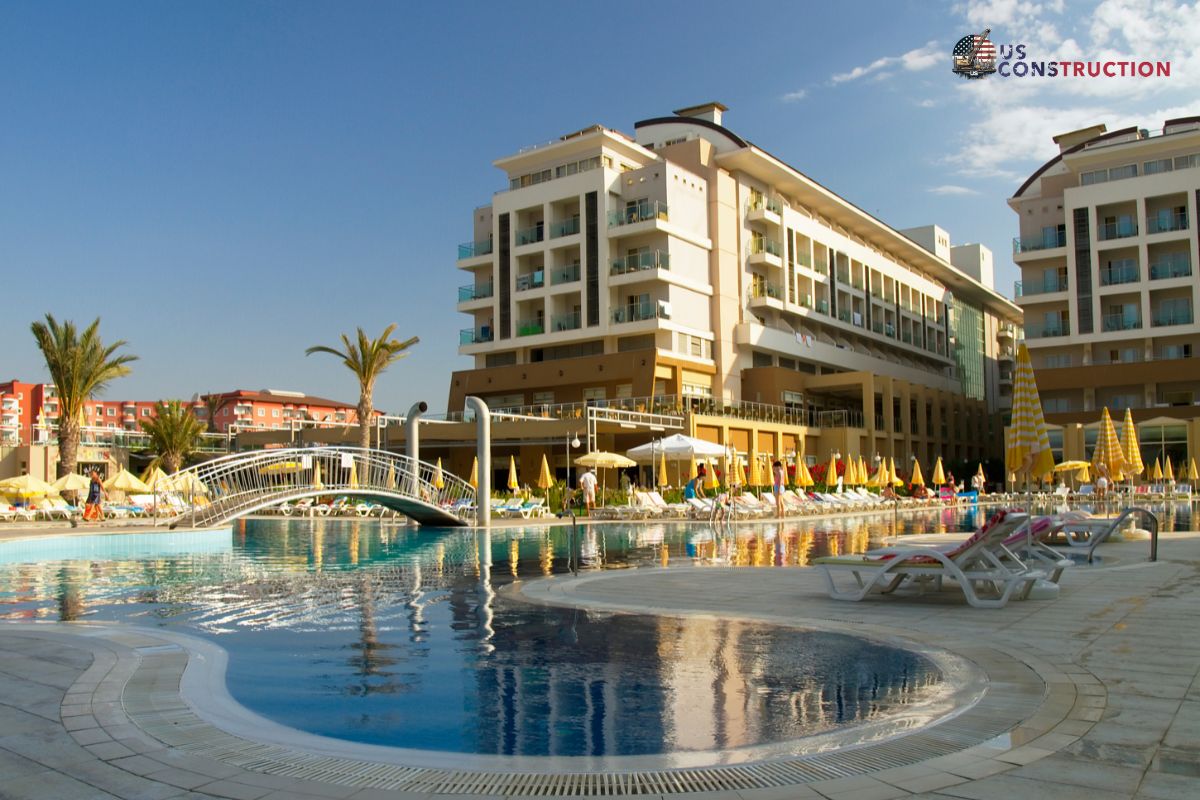If you are planning to construct a hotel, it requires strategic approaches which is far more than just placing bricks and plaster. Dining areas with modernized amenities to offer tenants the desired comfort and accessibility. Here, we discuss five key considerations for constructing a hotel to create durable structures that enhance your brand recognition and reputation.
US Construction Company is a reputable Houston commercial contractor, considering comfort, luxury, and functionality. In the highly competitive hospitality industry, even minor mistakes can have a significant impact on your business. Therefore, hiring authorized personnel protects your assets and maintains a positive reputation in the market.
Factors Influencing Hotel Development in Houston
In fact, Houston is a vibrant city located near a port and experiences rapid growth of industrialization and tourism. The contractors face particular challenges and difficulties when building a hotel. The varied market involves more than just conventional building methods.
Architects need to consider strategy in addition to structure. The following are the main elements that should be considered to develop a profitable and customer-focused hotel:
Location Alignment with Demographics
There is no universal solution for hotel development in Houston. The developers should analyze the needs and nearby amenities to craft a perfect design. The demands for a hotel near a business traveler or a medical center vary a lot.
For a successful hotel development project, the selection of the site is the most essential factor. It should be the focal point for other economic activities to target potential visitors. The hotel should have easy access to transportation hubs and other vital amenities.
Compliance with Zoning and Flood Regulations
Houston’s distinct rejection of conventional zoning regulations presents both advantages and disadvantages. Given Houston’s high risk of flooding, contractors need to be knowledgeable about the local development code. As this city is located in a region prone to heavy rainfall and flooding.
Obviously, to reduce the risk of flooding and satisfy local FEMA regulations. They should integrate elevated foundations with proper drainage systems. Moreover, premium-quality water-resistant materials are used.

Energy Efficiency Design
If the surrounding or regional climatic conditions are adverse, it will put extra pressure on HVAC systems. The experienced Houston commercial contractors completely understand this fact and install high-performance systems.
High-length windows, greener roofing materials, and adaptive HVAC are incorporated. In addition to boosting long-term profitability, these structures control utility bills. LEED accreditation or other green practices also draw in eco-aware tourists.
Amenities Based on Market Trends
In today’s times, visitors expect more than just a room to stay. They also demand places to work, meeting rooms, terrace social areas, and gyms. Versatile areas and exterior expansions of inside amenities are preferred. This market shift is more intense after pandemic periods.
Thus, they plan for future adaptation by collaborating with designers to assign multipurpose places. Now, hotels should have a dining room that serves as a conference area.
Local Workforce Utilization
Houston is a large metropolis with extensive infrastructure and significant urban sprawl. Contractors must carefully organize their logistics. Project expenses may increase due to construction delays. They should be self-sufficient in supplying materials and in accessing workers.
Project consistency can be improved and delays can be minimized by collaborating with local professionals. US Construction involves local material suppliers and utilizes a Houston-based construction workforce.
How to Select the Best Location for Hotel Development?
Choosing a hotel’s location is one of the most critical choices for a building company or real estate developer. A well-chosen site creates the foundation for sustained prosperity, financial gain, and visitor satisfaction.
Just as crucial as creating a beautiful home is selecting a good location. Developers should follow these essential recommendations and expert assessments while choosing a hotel location:
Understand the Market Demand
The initial step is to analyze the local demands of that specific area. Ask yourself if there is a genuine need for a hotel. Conveniently, the feasibility studies are an optimal way to check market trends. Examine the traffic pattern, business activities, and tourism in and around that area.
Consider the existing hotels and their occupancy rates. If the selected site has great demand, you will receive high rents. If you construct in oversaturated zones, the competition will be higher and the rental charges will be lower.
However, to obtain precise estimates, consider collaborating with a market research company or a hospitality expert.

Prioritize Accessibility
Access to basic facilities is essential for tourists. Indeed, the simple and close access to parking zones is facilitating for families and business travelers.
Accessibility to conference centers, entertainment venues, or retail areas gets more reservations. The Houston commercial developers create a brand identity for your hotel with unique and landmark infrastructures.
Consider Neighborhood Profile
The neighborhood of each infrastructure has a specific impact and tells a unique story. Make sure your selected site complements the nearby amenities.
- An elite or lavish hotel requires clean, safe surroundings with excellent dining and retail options.
- For mid-range hotels, pay attention to busy locations like those close to colleges or public transport hubs.
- Resorts or recreation hotels, beautiful settings next to lakes, beaches, historical landmarks, or natural parks.
Importantly, during site visits, also evaluate local laws, lighting, and crime statistics.
Land Cost vs. Long-Term ROI
Remarkably, the construction expenses and return on investment (ROI) are impacted by location. Although prime locations may have greater visitor and lodging rates, they also have higher property costs.
On the other hand, remote or emerging locations are less expensive. However, you need to adopt more aggressive marketing strategies or incentives to attract visitors.
Utilize location-specific predicted revenue models to conduct a comparative and cost-benefit analysis.
Understand Local Zoning Regulations
Before committing to any investment or property purchase, examine the zoning regulations. Is it legal to build hotels in that area? What is the highest possible floor area ratio (FAR) or dimensions of your design?
Verify the environmental constraints. Is the property in a sensitive zone, historically listed, or at risk for flooding?
Recognize the license prerequisites, particularly for hotels that should have event spaces, bars, or swimming pools. If you identify any red tape, approach a local attorney or municipal authority.
Competition in the Area
The hotel building should not stand alone in an isolated area. Consider the everyday activities around the selected site. Assess some crucial points like:
- Is there another hotel near yours?
- What kinds of amenities do they offer?
- Are there any new hotels being constructed around yours?
Seek out underutilized markets, such as areas with a lack of upscale resorts near a picturesque location or boutique hotels near a tech park.
Plan for Future Expansion
Consider the long-term trends and needs related to your project. Scalability is possible at the ideal settings. Satisfy these queries before making any decision.
- Will the hotel eventually be able to add more rooms or services?
- Is it possible to incorporate retail stores?
- What strategies does the Houston municipality have for future development?
Create a dynamic space that complements upcoming trends. You can expand your business to meet future needs securely and cost-effectively.
Environmental and Site Conditions
Indeed, the soil chemistry and physical attributes of the proposed site severely impact the overall construction cost. Moreover, the timeframes were also affected by these parameters.
Consider the sensitive zones surrounding the proposed site, particularly if it is located near a national park, a conservation area, or protected land. Give special attention to have a competitive edge.
Houston Commercial Contractor Near Me
Building a hotel is a complicated process that requires experts with extensive knowledge and technical support. Houston commercial contractors possess a precise vision, in-depth market knowledge, and a thorough understanding of the surrounding terrain.
In hotel development, every step impacts your future goals. Hire a construction expert who is familiar with the Houston regulatory framework and geological features. Contact US Construction Company to create next-level luxury structures.


Leave A Comment